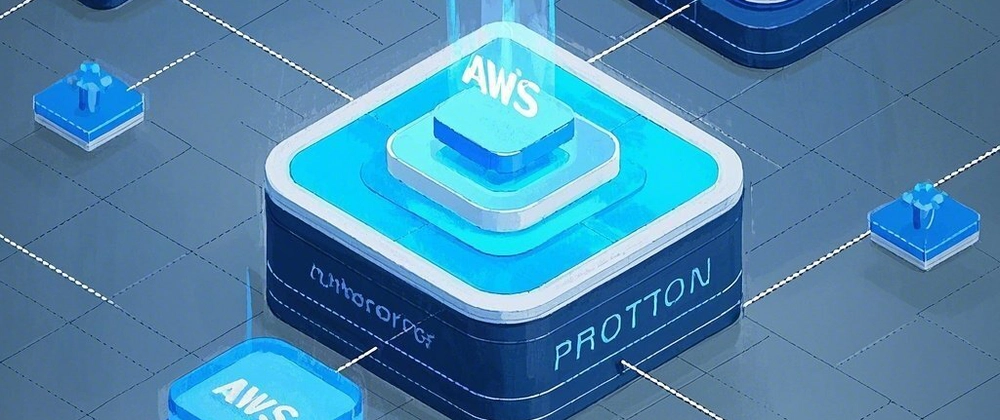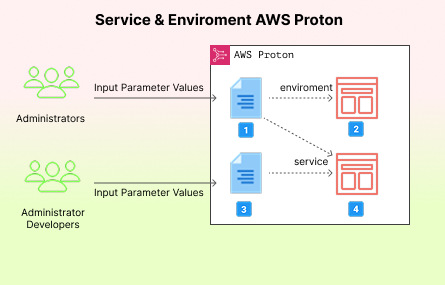Table of contents
- What is AWS Proton?
- AWS Proton & AWS Cloudformation is same?
- How AWS Proton Works?
- conclusion
Hey folks 👋,
maybe you just found out that AWS has released one of the new services again in 2020 which even I forgot about the new update :) AWS gave the name of the service called AWS Proton. maybe this proton is similar to the Cloudformation model infrastructure as code.
in this post I will introduce you to AWS Proton and the difference with cloudformation. 🌟
What is AWS Proton? 🤔
✅ AWS Proton is a powerful automation solution that simplifies infrastructure management and application deployment for both administrators and developers.
✅ For administrators, AWS Proton provides a comprehensive framework to create and maintain service templates containing complete application stacks.
✅ For developers, AWS Proton offers a self-service interface where they can easily choose pre-defined service templates that fit their project needs.
What is the difference between AWS Proton & AWS Cloudformation? ⚙
AWS CloudFormation :
✅ A general-purpose infrastructure as code (IaC) service
✅ Allows you to define and provision infrastructure resources using templates
✅ Supports a wide range of AWS resources and can be used for almost any infrastructure setup
✅ Primarily focused on infrastructure provisioning
✅ Works at a lower-level of abstraction, giving developers more granular control
AWS Proton :
✅ A higher-level, more opinionated service specifically for container and serverless applications
✅ Provides standardized, pre-approved templates for entire application stacks
✅ Includes built-in CI/CD pipeline configuration
✅ Focuses on creating a self-service platform for developers
✅ Automates not just infrastructure provisioning, but also deployment pipelines
How AWS Proton Works ? 👨💻
- When you choose an environment template with AWS Proton, you provide values for the relevant input parameters.
- AWS Proton prepares your environment based on the environment template and parameter settings.
- When you use AWS Proton to pick a service template, you supply values for the relevant input parameters. You also pick an environment in which to deploy your application or service.
- To supply your service, AWS Proton utilizes the service template as well as the values of your service and the environment parameters you have defined.
You choose the input parameters to modify your template for reuse and numerous use cases, applications, or services.
To make this work, you generate environment or service template bundles and submit them to the appropriate registered environment or service templates.
Use Cases
E-Commerce Platform Microservices
Detailed Scenario :
An e-commerce platform with multiple microservices requires a robust, scalable, and secure infrastructure that can handle varying loads and ensure consistent deployment across different services.
Specific Challenges
- Infrastructure Inconsistency: Each microservice (Product, Cart, Payment, User) was previously deployed with slight variations in configuration
- Security Complexities: Ensuring uniform security protocols across different services
- Deployment Overhead: Manual configuration and deployment processes were time-consuming
AWS Proton Implementation
-
Standardized Templates:
- Create a base template for all e-commerce microservices
- Define consistent networking, security groups, and compute resources
- Include standard monitoring and logging configurations
Deployment Workflow:
- Platform team creates a master template for e-commerce services
- Developers select and slightly customize the template
- Configure service-specific parameters
- Set scaling requirements
- Proton automatically provisions infrastructure
- Consistent network configuration
- Uniform security settings
- Standardized monitoring
Benefits Realized:
- 40% reduction in deployment time
- Improved security consistency
- Easier onboarding for new services
- Simplified infrastructure management
2. Digital Banking Application
Comprehensive Microservices Ecosystem
A digital banking platform requires extreme reliability, security, and compliance across multiple critical services.
Complex Requirements
- Regulatory Compliance: Must meet strict financial industry regulations
- High-Security Demands: Protection of sensitive financial data
- Performance Critical: Low-latency transactions
- Scalability Needs: Handle sudden traffic spikes
AWS Proton Solution
-
Compliance-Driven Templates:
- Embed security best practices directly in infrastructure templates
- Automatic encryption configurations
- Network isolation between services
- Compliance checkpoints in deployment pipeline
Advanced Implementation:
- Create separate environment templates for:
- Development
- Staging
- Production
- Implement service-specific security groups
- Automate compliance checks during deployment
- Enable automatic scaling based on transaction volumes
Key Advantages:
- Rapid compliance verification
- Consistent security posture
- Automated risk mitigation
- Faster time-to-market for new financial services
Conclusion 📃
AWS Proton emerges as an innovative cloud infrastructure automation solution that transforms how organizations manage and deploy serverless and container-based applications, providing administrators with a powerful framework for creating standardized templates and developers with a self-service interface to streamline application deployments.
Unlike the more generic CloudFormation, Proton takes a more opinionated approach with features like version management, automatic CI/CD pipeline configuration, and one-click infrastructure updates, allowing businesses to create more efficient, consistent, and scalable cloud deployment strategies.
By bridging the gap between infrastructure management and application development, AWS Proton enables technology teams to optimize development processes, reduce manual configuration overhead, and ensure alignment with organizational best practices, ultimately changing the way modern cloud-native applications are designed, provisioned, and maintained.




Top comments (0)